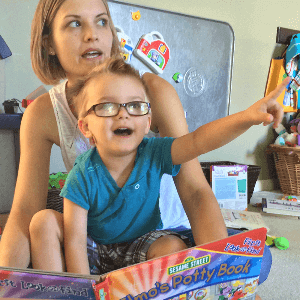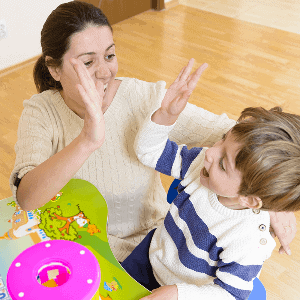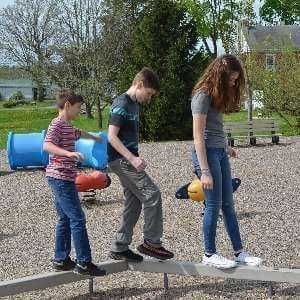Pivotal Phrases & Abnormal Speech in Children with Autism
The Question
One of our members, Jerry, said, “I have a two-year-old. I’ve completed all the units in your course as well as the homework. He’s working well with electronics, food, and drink, but not as well when working with a shoebox, toys, or puzzles. We should have a BCBA working with us soon, but he’s using some abnormal speech patterns. Things like saying “open door,” even if it isn’t a door he wants to open.
“Any suggestions on how to address these? I also watched the pointing video you made and he’s improving with that skill and will point at things, but he doesn’t look back at me when he’s pointing. Is this something you can teach? He also gives me things but it’s almost like “I’m done with this. You can have it” as opposed to, “Hey, look at this.” Is giving and sharing something that can be taught or is this a higher skill?”
Abnormal Speech Patterns in Children with Autism
I remember with my son, Lucas, that we taught him the phrase “open cabinet” so he could ask for the pretzels he wanted. But we did so many trials of “open cabinet” without me knowing that you can’t just target one specific phrase. If you do, your child or client can develop abnormal speech patterns. When we were trying to teach him to open a bottle or to say “open bottle,” he would say “open cabinet,” because that’s what he was taught. He was overgeneralizing and having conditional discrimination errors. It’s super important to stick with one-word phrases and build skills as naturally as possible to avoid abnormal speech patterns.
I have a two-word pivotal phrase sheet that outlines different phrases we can teach. I’ve also talked about carrier phrases, but I wouldn’t teach those in this case. I’m very careful about teaching two-word pivotal phrases and carrier phrases. You really have to have good programming with them. I like to let language develop as naturally as possible, and increasing to two-word pivotal phrases too fast can often develop into abnormal speech patterns within language disorders.
Attend a FREE Workshop!
Pivotal Phrases
To help with this, stick with one-word pivotal phrases. Say you want him to ask to open a bottle. Since he’s already saying “open door,” make sure he is not by the door. Then, drop the phrase back to “open.” I would say “open” and I wouldn’t string it together with any other words. Even for doors, I might scale it back. I would pause and before he says open, I would say “open, open” slowly.
I would also generalize “open” by using a box. Don’t teach the pivotal phrase “open box.” Just go with one word at a time. Here I would put something fun in the box and I would prompt him to say “open.” Then he says “open.” Now, if I say “open” and he says, “open door.” I would go back to “open, open, open.” Ask him, “What should I do? Open?” Then he gets reinforcement by opening the box. You can do this with a favorite drink, a door, a toy, and more.
Language Development Takes Time
Scale it back. I know that it feels like you’re going backward instead of forward, but it will really help to get rid of abnormal speech patterns.
I’m a big proponent of letting language develop naturally, especially for young children.
My mission is to provide practical strategies to both parents and professionals so they can help children with Autism reach their fullest potential. For more information about pivotal phrases and abnormal speech patterns consider taking one of my courses below.
- Stop Waiting and Worrying About Autism: 3 Secrets to Turn Autism Around in any Toddler or Preschooler
- 3 Big Autism Mistakes Parents Make (and what to do instead)
- 3 Biggest Mistakes Autism Professionals Make With Intermediate Learners
Attend a FREE Workshop!
Transcript
Speech that is unnatural is very common in kids with autism. For example, if you teach a child with limited speech open door, they might over-generalize it and say open door even if I’m trying to get them to say open bottle. Hi, I’m Dr. Mary Barbera, autism mom, Board Certified Behavior Analyst, online course creator, and bestselling author of The Verbal Behavior Approach. Each week I provide you with some of my ideas about turning autism around, so if you haven’t subscribed to my YouTube channel you can do that now. Today I’m sharing a small excerpt from a recent live Q and A session where I give you tips about what you can do to help a child with unnatural speech. Jerry said, I have a two two year old. No one said his functioning level. I’ve completed all the units and homework. Excellent. Congratulations. He’s working well with an electronic and food and drink but not as well without them just doing the shoe box toys and puzzles.
We should have a BCBA working with us soon. Excellent. He’s doing some unnatural speech things like says open door, even if it isn’t a door says up and then da and then add down calls all the shows he likes Pepin, Peppa the pig. Any suggestions on how to address these? I also watched the pointing video and he’s improving with the skill and will point at things, but he doesn’t look back at me, joint attention. Is this something you can teach to look at someone after he’s pointed? He also gives me things, but it’s almost like I’m done with this. You can have it as opposed to, Hey, look at this. Is this something that can be taught to give and share or is this a higher skill? All excellent questions. Congratulations for finishing the course and doing all the homework. Congratulations for moving forward and trying to get a BCBA.
That’s a big feat. Um, and then the unnatural speech, uh, open door even. I remember with my son, we taught him open. Well, we, we taught him open cabinet, um, to get the pretzels, but we did like so many trials of open cabinet without me knowing that you can’t just target open cabinet because then when we were trying to teach him to open a bottle or to say open, open bottle, he would say open cabinet. So he was overgeneralizing and having conditional discrimination errors. That’s why it’s super important to stick with one word responses, um, and build skills as naturally as possible. So I believe somewhere in this course is two word, pivotal phrase sheet. If it’s not, um, I can post it in the vials, uh section of this. But this is why I don’t teach carrier phrases ever. Uh, this is why I’m very careful about teaching.
Um, even two word, uh, you know, even the two word pivotal phrases because you really have to be careful, have good programming. I like to let language develop as naturally as possible. So, um, I would caution you about, you know, so, so say your uh, say your by not the door. Say your, you have something and you want him to say open or open bottle. Now he’s saying open door. So I would just drop it back. So he says open, open door and I would be like shh, open and I wouldn’t string it together with any other word, open. So even for doors, um, I might scale it back and, and if I would pause and before he says open, open door, I would even go open, open. And then I would generalize it with a box. Um, but don’t generalize and teach open box because what he’s showing you is he, he needs to just go with one word.
So here I would be like, put something fun in the box and I would prompt open and he says open. Now if I say open and he says, open door, no, no. Listen, listen, open, open, good. Open. What should I do? Open. And then he gets a reinforcement. Um, and then, you know, uh, a favorite drink, open, open, and then the door. So scale it back. I know it feels like you’re going backwards instead of forwards. Um, also Google Mary Barbera carrier phrases. I’m a big proponent on letting, letting language develop, especially for a two year old. Wherever you’re watching this, I’d love it if you would leave me a comment, give me a thumbs up, share this video with others who may benefit, and for more information, you can attend a free online workshop at marybarbera.com/workshop and I’ll see you right here next week.
[/vc_column_text] Download the Transcript






